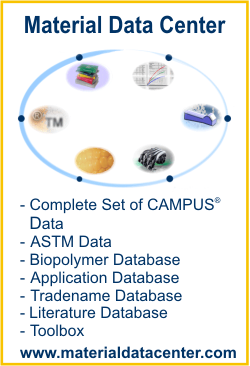Material Data Center is a leading international information system for the plastics industry. Material Data Center offers a comprehensive plastics database, calculation tools, CAE interfaces, a literature database and an application database. For more information about Material Data Center visit www.materialdatacenter.com.
This is the free Material Data Center Datasheet of CELCON® M25UV - POM - Celanese
unit conversion, PDF datasheet print, comparison with other plastics, snap fit calculation, beam deflection calculation, CAE Interfaces
Check here, which other Celcon datasheets, application examples or technical articles are available in Material Data Center
| Caracteristicas de procesamiento y fisicas | Valor | Unidades | Método de ensayo | ||||||||||||||||||||||||||||||||||||||||||||||||||||||||||||||||||||||||||||||||||||||||||||||||
| ISO Data | |||||||||||||||||||||||||||||||||||||||||||||||||||||||||||||||||||||||||||||||||||||||||||||||||||
| Indice de fluidez volumétrico, MVR | 2.2 | cm³/10min | ISO 1133 | ||||||||||||||||||||||||||||||||||||||||||||||||||||||||||||||||||||||||||||||||||||||||||||||||
| Temperatura | 190 | °C | - | ||||||||||||||||||||||||||||||||||||||||||||||||||||||||||||||||||||||||||||||||||||||||||||||||
| Carga | 2.16 | kg | - | ||||||||||||||||||||||||||||||||||||||||||||||||||||||||||||||||||||||||||||||||||||||||||||||||
| Contracción posterior al moldeo, paralelo | 2.2 | % | ISO 294-4, 2577 | ||||||||||||||||||||||||||||||||||||||||||||||||||||||||||||||||||||||||||||||||||||||||||||||||
| Contracción posterior al moldeo, normal | 1.8 | % | ISO 294-4, 2577 | ||||||||||||||||||||||||||||||||||||||||||||||||||||||||||||||||||||||||||||||||||||||||||||||||
| Propiedades mecánicas | Valor | Unidades | Método de ensayo | ||||||||||||||||||||||||||||||||||||||||||||||||||||||||||||||||||||||||||||||||||||||||||||||||
| ISO Data | |||||||||||||||||||||||||||||||||||||||||||||||||||||||||||||||||||||||||||||||||||||||||||||||||||
| Módulo de tracción | 2500 | MPa | ISO 527 | ||||||||||||||||||||||||||||||||||||||||||||||||||||||||||||||||||||||||||||||||||||||||||||||||
| Esfuerzo de fluencia | 62 | MPa | ISO 527 | ||||||||||||||||||||||||||||||||||||||||||||||||||||||||||||||||||||||||||||||||||||||||||||||||
| Alarg. en límite elástico | 12 | % | ISO 527 | ||||||||||||||||||||||||||||||||||||||||||||||||||||||||||||||||||||||||||||||||||||||||||||||||
| Resistencia al impacto Charpy c/entalla, +23°C | 8.5 | kJ/m² | ISO 179/1eA | ||||||||||||||||||||||||||||||||||||||||||||||||||||||||||||||||||||||||||||||||||||||||||||||||
| Propiedades térmicas | Valor | Unidades | Método de ensayo | ||||||||||||||||||||||||||||||||||||||||||||||||||||||||||||||||||||||||||||||||||||||||||||||||
| ISO Data | |||||||||||||||||||||||||||||||||||||||||||||||||||||||||||||||||||||||||||||||||||||||||||||||||||
| Temperatura de fusión, 10°C/min | 166 | °C | ISO 11357-1/-3 | ||||||||||||||||||||||||||||||||||||||||||||||||||||||||||||||||||||||||||||||||||||||||||||||||
| Estabilidad al calor, 1.80 MPa | 93 | °C | ISO 75-1/-2 | ||||||||||||||||||||||||||||||||||||||||||||||||||||||||||||||||||||||||||||||||||||||||||||||||
| Coef.de expansión térmica lineal, paralelo | 120 | E-6/K | ISO 11359-1/-2 | ||||||||||||||||||||||||||||||||||||||||||||||||||||||||||||||||||||||||||||||||||||||||||||||||
| Coef.de expansión térmica lineal, normal | 120 | E-6/K | ISO 11359-1/-2 | ||||||||||||||||||||||||||||||||||||||||||||||||||||||||||||||||||||||||||||||||||||||||||||||||
| Otras propiedades | Valor | Unidades | Método de ensayo |
| Absorción de agua | 0.75 | % | Sim. to ISO 62 |
| Absorción de humedad | 0.2 | % | Sim. to ISO 62 |
| Densidad | 1410 | kg/m³ | ISO 1183 |
| Recomendación para procesamiento Moldeo por inyección | Valor | Unidades | Método de ensayo |
| Temperatura de pre-secado | 80 | °C | - |
| Tiempo de pre-secado | 3 | h | - |
| Humedad de procesamiento | ≤0.35 | % | - |
| Temperatura de la masa | 182 - 199 | °C | - |
| Temperatura del molde | 82 - 93 | °C | - |
Standard reciprocating screw injection molding machines with a high compression screw (minimum 3:1 and preferably 4:1) and low back pressure (0.35 Mpa/50 PSI) are favored. Using a low compression screw (I.E. general purpose 2:1 compression ratio) can result in unmelted particles and poor melt homogeneity. Using a high back pressure to make up for a low compression ratio may lead to excessive shear heating and deterioration of the material.
Melt Temperature: Preferred range 182-199 C (360-390 F). Melt temperature should never exceed 230 C (450 F).
Mold Surface Temperature: Preferred range 82-93 C (180-200 F) especially with wall thickness less than 1.5 mm (0.060 in.). May require mold temperature as high as 120 C (250 F) to reproduce mold surface or to assure minimal molded in stress. Wall thickness greater than 3mm (1/8 in.) may use a cooler (65 C/150 F) mold surface temperature and wall thickness over 6mm (1/4 in.) may use a cold mold surface down to 25 C (80 F). In general, mold surface temperatures lower than 82 C (180 F) may hinder weld line formation and produce a hazy surface or a surface with flow lines, pits and other included defects that can hinder part performance.
Postprocessing conditioning and moisturizing are not required. It may be necessary to fixture large or complicated parts with varying wall thickness to prevent warpage while cooling to ambient temperature.
Material Data Center is provided by M-Base Engineering + Software GmbH. M-Base Engineering + Software GmbH assumes no liability for the system to be free of errors. Any decision about the application of materials must be double checked with the producer of this material.
Additional information about this material, like producer contact address, etc. can be found at www.materialdatacenter.com. For access to this extra information a registration is requested. Free online registration is available.













